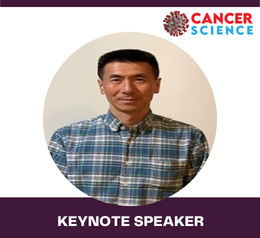Scholars World Congress on
Cancer Research and Oncology
THEME: "Frontiers in Cancer Research and Oncology"
 14-15 Nov 2022
14-15 Nov 2022  TIME Asma Hotel, Albarsha | Dubai, UAE & Online (Hybrid event)
TIME Asma Hotel, Albarsha | Dubai, UAE & Online (Hybrid event) THEME: "Frontiers in Cancer Research and Oncology"
 14-15 Nov 2022
14-15 Nov 2022  TIME Asma Hotel, Albarsha | Dubai, UAE & Online (Hybrid event)
TIME Asma Hotel, Albarsha | Dubai, UAE & Online (Hybrid event) 
Stony Brook University, USA
Title: Quantifying landscape and flux reveals global and physical mechanism of cancer
Dr. Jin Wang is currently a professor of Chemistry and Physics at State University of New York at Stony Brook (2004-now). He got his Ph.D in University of Illionois at Urbana-Champaign (1991). He was a post doctoral research fellow at University of Illinois (1991-1996). He was a guest scientist at NIH (1996-1997). He was also a senior analyst and vice president at global strategic analytics unit at Citibank (1997-2004). He is a fellow of European Academy of Sciences (2021), a fellow of American Association of Advancements in Sciences (2012), a fellow of American Physical Society (2010). He specializes in nonequilibrium physics and biological physics. He has published over 370 peer reviewed papers. His papers were referenced over 12500 times. His H-index is 58.
Cancer is the second leading cause of death globally, yet the physical understanding of cancer formation is still challenging. In this talk, I will review our recent efforts in developing a landscape and flux theory based on the underlying regulatory gene networks. The landscape can quantify the weight of each state and therefore its topography such as basin depth and width as well as the barrier height between the states can be used to explore the stability of each state. The flux is related to the thermodynamic cost and can be used to quantify the energy input or metabolic utilization. The larger flux can lead to instability of the current state such as normal and the formation of the new state such as cancer. We performed the global sensitivity analysis based on the global landscape topography and flux to find out the key genes and regulations for the cancer formation. This provides a new way of identifying the hot spots for cancer. We apply our framework to several types of cancer such as breast cancer and gastric cancer, as well as several key issues of cancer such as cancer stem cell, epigenetic effects on cancer, cancer metabolism and cancer immunity. The results show that landscape and flux can be used to reveal the underlying mechanisms of cancer formation in different perspectives than the current available ones.